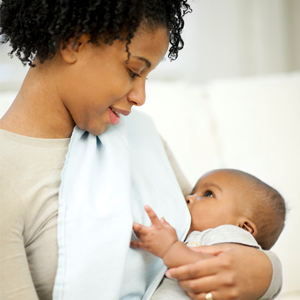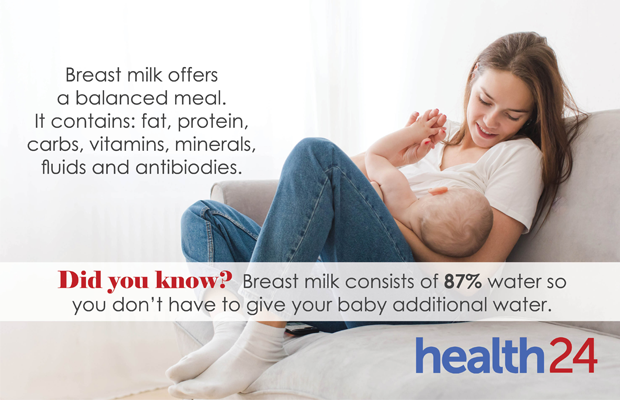
Drinking alcohol while breastfeeding is a bit of a controversial topic, says Catherine Pereira, Association for Dietetics in South Africa spokesperson, registered dietitian and lecturer at the University of the Western Cape.
But, she warns that drinking alcohol while breastfeeding is quite different to drinking alcohol while you are pregnant.
“During pregnancy, alcohol can move across the placenta, is toxic to the developing foetus, and in high amounts can cause serious damage. With breastfeeding, the alcohol does not transfer straight into the breastmilk. Any food or drink that a mother consumes needs to be digested first, so will transfer through her whole gastrointestinal tract (stomach, intestines etc.), get broken down and then individual nutrients are absorbed into the blood," says Pereira.
She adds that there are many factors that influence the composition of breastmilk, and the production of breastmilk is largely controlled by the hormones prolactin and oxytocin as well as the frequency (how often) a mother breastfeeds.
So, is it safe to consume alcohol while breastfeeding?
Pereira refers to Dr Jack Newman, a renowned and recognised breastfeeding advocate, who recently compiled a Facebook post summarising his recommendations regarding breastfeeding and alcohol.
Dr Newman says, "The alcohol content in breast milk immediately after drinking is equivalent to a 0.0274 proof beverage. That's like mixing 1 oz of 80 proof vodka (one shot) with 2 919 oz of mixer. By the way, 2 919 oz is over 70 liters [sic]."
“The take-home message of this is that the amount of alcohol that eventually is present in breastmilk is so low that it is unlikely to affect the baby,” says Pereira. In South Africa, however, the recommendation is that if people do drink alcohol, they do so in moderation.
The National Institute on Alcohol Abuse and Alcoholism says that low-risk drinking can be defined as consuming up to one unit of alcohol per day, with no more than three drinks on a single day and no more than seven drinks per week for women; while for men it's up to two drinks per day with no more than four drinks per day for men and then no more than 14 units of alcohol per week.
"Don't forget, though, that what you consider to be one unit of alcohol is often much less than one drink!" says Pereira.
If you do choose to drink alcohol while breastfeeding, Pereira advises that you do so straight after a feed so that your body has the maximum amount of time to metabolise the alcohol before your baby's next feed.
Breastfeeding guidelines
If you are worried about the wellbeing of your baby while breastfeeding, Dr Ronald Marino, chief of the division of general paediatrics at NYU Winthrop Hospital in Mineola, New York, advises on erring on the side of caution. "Most things do get into breast milk, and we need to understand this more because we don't know if there's a safe exposure level for babies. But it's probably better not to be exposed.
"Your baby's brain is developing so much in the first year of life, you want to give them every chance to have high function. Try to stay as pure as you can when breastfeeding – [avoiding] marijuana, alcohol or even herbal remedies," he said.
Here are some important breastfeeding guidelines, according to a previous Health24 article:
- Do not smoke or use any recreational drugs.
- If you are taking medication for a chronic condition, speak to your doctor before you start breastfeeding.
- There are no foods that you must avoid, just ensure that you are following a balanced diet with variety.
- Strong-flavoured food may flavour your breastmilk but this will not affect your baby.
- Avoid dieting while you are breastfeeding. Pereira adds that you should lose some weight when you breastfeed.

10 additional messages
Pereira also points to the National Department of Health, which offers 10 important infant feeding messages:
1. During their first six months of life, the World Health Organization recommends that babies need breastmilk and nothing else (no porridge, water, tea or other foods and liquids).
2. Breastfeeding is the normal way to provide babies with food for healthy growth and development.
3. It is safe for HIV positive mothers to breastfeed their babies while using antiretroviral treatment.
4. Mothers should be supported and shown how to initiate breastfeeding within the first hour after birth.
5. Mothers need to be supported to breastfeed successfully. Support them to get the baby to latch. Proper attachment encourages release of breast milk.
6. Almost all mothers will have enough breast milk to feed their babies exclusively during the first six months.
7. Everyone should support a mother to breastfeed her baby for a better, healthier life.
8. Happy breastfeeding moms make happy employees – employers must offer them privacy and time to express at work.
9. Continue to breastfeed and start introducing freshly prepared foods (such as fish, meat, vegetables and fruits) when the baby is six months old.
10. Babies should be taken to the clinic every month to check their growth and development.
Image credit: iStock




 Publications
Publications
 Partners
Partners














